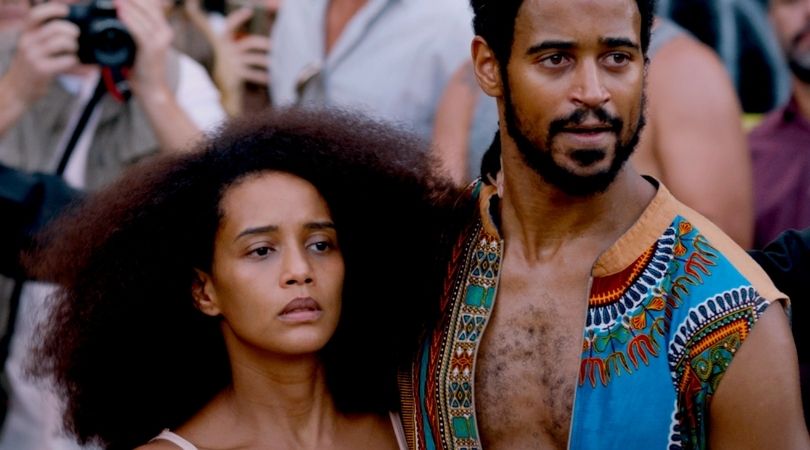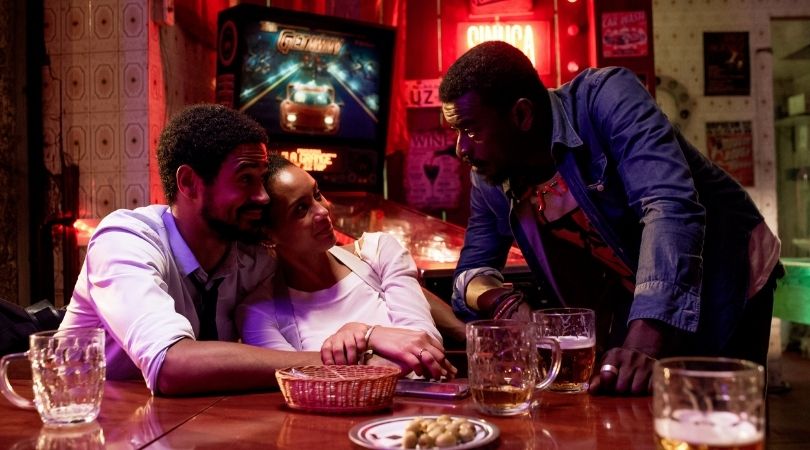
Executive Order makes its premiere at this year’s SXSW Film Festival in the 2021 Spotlight Film Screening section. It was initially set for its world premiere at last year’s SXSW Film Festival. However, the previous year’s unprecedented political events have made this film more timely as it is one of the must-see films of 2021, in my opinion. The film marks the directorial debut for Lázaro Ramos, one of Brazil’s most acclaimed actors.
Executive Order tells the story of a dystopian near-future where Brazil’s authoritarian government orders all African descent citizens to move to Africa. The forced departure creates chaos, protests, and an underground resistance movement that inspires the nation. The film is written by Lusa Silvestre, Aldri Anunciação, Elísio Lopes Jr. and Ramos. The principal cast includes Alfred Enoch (How to Get Away With Murder, Harry Potter film series), Taís Araujo (Spies in Disguise), and international musical artist Seu Jorge (Brotherhood).
Executive Order opens in a not-so-distant future set in Rio de Janeiro, Brazil, where people of African descent are no longer referred to as “black,” instead they are called “high-melanin.” Antônio, played by Alfred Enoch, is a high-melanin lawyer who sues the Brazilian government for reparation of all descendants of African slaves.
In response, the authoritarian regime signs an Executive Order 1888, the name of the Order pays homage to the year Brazil abolished slavery. The order’s purpose is to make amends for the country’s history of slavery instead of paying the reparations. Initially, the Order established a government program that would pay high-melanin citizens and anyone whose features even slightly resemble African to move to Africa if they wish to do so.
Antônio discusses the controversial executive order with his wife Capitu, who is a doctor played by Taís Araújo, and cousin André, played by Seu Jorge, who is a journalist. They debate social and racial issues and share the same yearning for the change of country. Meanwhile, other citizens, including white people trying to pass as high-melanin Brazilians, opt in to the program to go to Africa. However, as Executive Order progresses, the order’s true sinister intent is revealed to create an all-white Brazil.
As things become more dire, the government no longer gives black citizens a choice in the matter. They begin arresting and forcing all black or high-melanin citizens to move to Africa. As the government rapidly enforces martial law and descends into chaos. Snatching people off the street, out of their work, and even separating children from their parents.
Antônio discovers a loophole in the Order; the soldiers can not enter citizens’ homes without permission. He and André hole up in Antônio’s apartment to evade capture as they wait for Capitu’s return home. Their resistance sparks a movement and brings awareness to the crisis around the world. André enlists his cousin and wife; the three fight to survive the madness and try to escape capture at every turn.
The performances in Executive Order are simply stellar! The entire principal cast embodies their roles individually and plays well off one another. Each of them brings something special that makes characters and made them feel like their own. Araujo does an excellent job portraying the multifaceted layers of Capitu from strength and resourcefulness to frustration and exhaustion. Enoch’s expert portrayal as the optimistic ethical lawyer who then transitions into an anguished rebel becomes the face of resistance. While Jorge’s performance as the witty journalist, André gives a unique balance of humor and despair as the gravity of his and Antônio’s situation becomes more desperate.
I applaud Ramos and his team for creating and telling this story. They take the phrase “Go back to Africa” and turned it into a movie that shows the terror and chaos that would come about in reality. And even though this is a film about racism, I greatly appreciate that the filmmakers took the effort to show more than just pain. They make an effort to create something that feels authentic and attempts to show the black experience’s various layers and perspectives.
I also loved how the filmmakers include some historical and political references throughout the film. For example, while Capitu flees from the soldiers, she comes across Ivan, who promises to lead her to safety. Ivan then brings Capitu to a hideout filled with other black people fleeing from deportation. Ivan informs her of how the space was originally a slave depository. Now they refer to it as the “Afro-bunker, their haven and base of operations for the resistance. Capitu equates the bunker to a quilombo. A quilombo is a Brazilian hinterland settlement that was founded by escaped slaves and other Africans in Brazil.

Additionally, the film is beautifully shot as it captures various sides of Rio de Janeiro companied by samba music that is an excellent touch to the film’s atmosphere. I especially loved how the film features scenes that highlight everyday and community life throughout the city. One in particular that I liked was when a group of Capoeira martial artists are practicing outside.
In regards to writing, the dialogue and monologues in this film are powerful and striking. They don’t hold back on the message and emotions they want to deliver to the audience. For example, in one scene where Antônio’, exhausted from lack of food, power, water, and medicine, screams “Brazil is mine too!” from his balcony. He says how much he loves this country even if it and the racist government do not want him there. He wants them to acknowledge and face him and his blackness. He is driven to the edge of despair and nearly blind due to lack of insulin. He continues to resist. He refuses to leave the country that is rightfully his just as much as anyone else’s.
Executive Order seeks to make a powerful statement on social and racial issues. The film strives to provoke emotions in the audience while delivering a cautionary tale. It is sad but accurate to say that this film’s events feel authentic because it feels they could tomorrow, given the real-life events involving forced deportation, police brutality, and protests that have taken place over recent years. It makes the film a very timely piece.
However, some scenes leading up to the film’s final minutes left me slightly confused at first. Some things were not clear if the scene was meant to be symbolic or happening during the same events. My interpretation of the ending is that the film sends the message that as much as racism wants to erase black people from existence, we will continue to exist.
Overall, Executive Order is a timely must-see film that seeks to make a powerful statement on race. Every member of the principal cast delivers powerful performances. Enoch, Araujo, and Jorge each completely embody their roles and make the characters feel like their own. The movie is beautifully filmed as it infuses historical references and scenes highlighting the community life in Rio de Janeiro. All in all, Executive Order is striking, powerful, and well worth the watch. It has the potential to spark thoughtful discussions and provide unique perspectives on race.
Executive Order premieres on March 16 at the SXSW Film Festival.
Executive Order
TL;DR
Overall, Executive Order is a timely must-see film that seeks to make a powerful statement on race. Every member of the principal cast delivers powerful performances. Enoch, Araujo, and Jorge each completely embody their roles and make the characters feel like their own. The movie is beautifully filmed as it infuses historical references and scenes highlighting the community life in Rio de Janeiro. All in all, Executive Order is striking, powerful, and well worth the watch. It has the potential to spark thoughtful discussions and provide unique perspectives on race.






